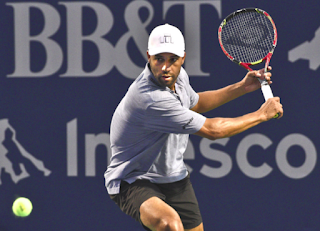
YONKERS: When James Blake unofficially retired from professional tennis in August 2013, he was a household name.
Over the course of a roughly 14-year career, the 38-year-old American from Yonkers, N.Y., worked his way to becoming the fourth-ranked singles player in the world, with 10 wins on the ATP World Tour and countless trips to grand slams.
Roland Garros, Wimbledon, Flushing Meadows — you name it, he’s probably been there. And deep in the draw.
But Blake by no means coasted through his career. In May 2004, during the Italian Open, he was practicing with fellow American Robby Ginepri on a drizzly day in Rome. Both lost in the first round, and they found a clay court to, naturally, play a match.
Blake slipped, and his body surged forward, hitting the net post while running down a drop shot. He fractured seven vertebrae — all just before the French Open.
That same year, his father, Thomas, died of stomach cancer. Blake also developed shingles on his face, known as zoster, which attacked nerves and led to temporary paralysis in half his face.
Going from highs to lows in such a short span of time caused him to search his soul.
“The doctors told me it was something where they wouldn’t even be able to tell if it will ever get better, or they’d have to do an experimental procedure to put a nerve from my leg into my face,” said Blake. “Even then, they said it’d take a month to determine whether I was going to heal at all.
“So, for that month, not knowing if I was ever going to play tennis again — or if I would ever look normal again, be able to smile or close my eye in a normal way — that made me think about what else I could do.”
As Blake sat just a few feet away from the practice courts Aug. 19 at the Wake Forest Indoor Tennis Center before the eighth-annual Winston-Salem Open, he had a smile on his face. He was healthy, having played another nine years in his career on the ATP Tour and gearing up for an exhibition match against Michael Chang in the Invesco Series QQQ event.
Blake isn’t the only professional tennis player to endure stress and uncertainty during the heat of competition. Those life struggles have even led to anxiety and depression for other players.
On Wednesday at the Winston-Salem Open, the ATP 250 tournament held a mental health awareness day as a community campaign, in conjunction with Westwood Swim and Tennis Club along with the Mental Health Association of Forsyth County, with the hope of calling attention to an issue faced by both everyday people and professional athletes.
While Blake never dealt with anxiety or depression, he is familiar with it. His friend and fellow American, Mardy Fish, suffered from an arrhythmia that made his heart race. It translated into an anxiety disorder, which even forced him to duck out of the Winston-Salem Open in 2013 because of a panic attack.
And even more athletes are speaking up about mental health issues, with some of the latest being Kevin Love of the Cleveland Cavaliers and DeMar DeRozan of the San Antonio Spurs.
“The actual mental health is something that’s really important, and for athletes to have spoken up, I think is really inspirational — Mardy Fish was one of the first, and one of my best friends — and for others to know, what he went through as an athlete and just as a human being, people forget you’re a human being and that you have those problems,” said Blake. “You know, to have guys like Kevin Love and DeMar DeRozan speaking about it … it’s something that you wouldn’t wish on anyone, but it’s very positive they’re speaking up about it.”
“You realize how many people have problems with anxiety, with depression, with suicidal thoughts. … You don’t want them to have a stigma, you want them to realize they can go get help.”
For Steve Johnson, who played in the Winston-Salem Open final Saturday against Russian Daniil Medvedev, the past year has been especially difficult. With the death of his father, Steve Sr., in May 2017, he’s also been battling anxiety issues.
He hopes the stigma surrounding mental health being considered a debilitating condition will one day dissolve.
“Hopefully the stigma of this is a weakness will go away, and just something that will go away,” said Johnson, who is currently ranked 34th in the world. “Then we can all work together and can push through these boundaries.”
With more athletes speaking up, and events geared toward promoting mental health awareness, Johnson hopes to see progress.
“All it takes is one,” Johnson said. “So it takes one brave person with a big enough platform to get the world to realize. So we’ll see what happens going forward. But it’s something I hope nobody has to deal with, of course.